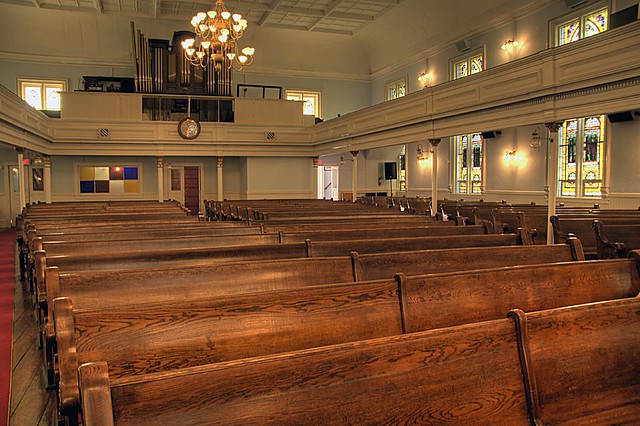
First African Baptist Church of Savannah, Georgia
From PBS's series Africans in America -- Andrew Bryan, the founder of the First African Baptist Church, was born enslaved in 1737, on a plantation outside of Charleston, South Carolina. He served as coachman and body servant to Jonathan Bryan, who along with his brother Hugh and several other planters, was arrested for preaching to slaves. Jonathan Bryan's plantation became the center of efforts by dissenting group of planters to evangelize their slaves.
In 1782, Andrew was converted by the preaching of George Liele, the first black Baptist in Georgia, who was licensed to preach to slaves along the Savannah River. Liele baptized Andrew and his wife Hannah. When Liele and hundreds of other blacks left with the British later that year, Andrew continued to preach to small groups outside of Savannah. With his master's encouragement, he built a shack for his small flock, which included a few whites. Although he brought hundreds into his church, 350 others could not be baptized because of their masters' opposition.

Andrew Bryan (1737 - 1812)
Fearing slave uprisings and desertions to the British, Georgian masters forbade their slaves to listen to Andrew's sermons. Even slaves who had passes were stopped and whipped, and members of the church, both slave and free, were harassed, whipped, and jailed. Jonathan Bryan and several other sympathetic planters protested Andrew's imprisonment. Upon his release he continued to preach in a barn on the Bryan plantation, between sunrise and sunset.
With the support of several prominent white men of Savannah who cited the positive effect of religion on slave discipline, Andrew was ordained and his church certified in 1788. When his own master died, Andrew Bryan purchased his freedom. In 1794, Bryan raised enough money to erect a church in Savannah, calling it the Bryan Street African Baptist Church -- the first black Baptist church in Georgia (and probably the United States), as well as the first Baptist church, black or white, in Savannah. By 1800, the church had grown to about 700; they reorganized as the First Baptist Church of Savannah, and 250 members were dismissed in order to establish a branch outside of Savannah.

Bryan died in 1812, having obtained a house of his own, property in Savannah and in the country, and the freedom of his wife -- though his "only daughter and child, who is married to a free man" remained in slavery along with her seven children, since according to law children inherited the condition of their enslaved mothers. (source: PBS)

Remarkably, a few black preachers in the South succeeded in establishing independent black churches. In the 1780s, a slave named Andrew Bryan preached to a small group of slaves in Savannah, Ga. White citizens had Bryan arrested and whipped. Despite persecution and harassment, the church grew, and by 1790 it became the First African Baptist Church of Savannah. In time, a Second and a Third African Church were formed, also led by black pastors. (source: PBS)

Great post. I was checking constantly this blog and
ReplyDeleteI'm impressed! Very useful info specifically the last part :) I care for such info a lot. I was seeking this particular information for a long time. Thank you and best of luck.
Here is my website - contact